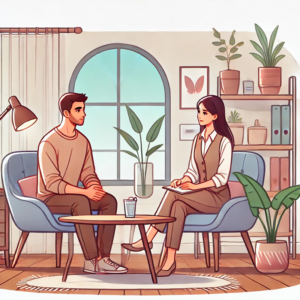 What is Anxiety?
What is Anxiety?
Feeling anxious is a normal part of life. It helps protect us and can even be useful, like when you’re nervous before a big test or project. But when anxiety gets too strong and lasts too long, it can stop you from enjoying life. If you’re always worried about the future, it might be time to talk to someone.
When to Seek Help
If anxiety is making it hard to live your daily life, talk to your healthcare provider. They can help you figure out if you have an anxiety disorder and what to do next.
Anxiety vs. Depression vs. Stress
Anxiety
This involves ongoing, uncontrollable feelings of worry about things that might happen. The fear isn’t always based on reality and can be triggered by many things. It can be a mental health disorder.
Depression
This is a long-term feeling of sadness, hopelessness, and lack of interest in activities. It’s caused by various factors and is also a mental health condition.
Stress
Stress usually happens in response to specific situations, like being overloaded with work. It’s short-term and not considered a mental illness, but if it’s not managed, it can lead to other health problems.
Causes of Anxiety
Anxiety can be caused by several factors:
- Biological Factors: It can happen due to chemical changes in your brain or how your brain processes emotions.
- Environmental Factors: Traumatic life events, like losing a loved one, financial stress, or problems at work, can trigger anxiety.
- Social and Cultural Factors: Experiences like discrimination or trying to fit in can lead to anxiety. Not having access to mental health resources can also make things worse.
Signs and Symptoms of Anxiety
Anxiety can feel different for everyone, but some common signs include:
Mental Symptoms:
- Avoiding situations
- Excessive worry
- Feeling on edge
- Trouble focusing
Physical Symptoms:
- Chest tightness or pain
- Dizziness
- Stomach pain or nausea
- Trouble sleeping
 Can Anxiety Make You Sick?
Can Anxiety Make You Sick?
Yes, untreated anxiety can worsen physical health problems. It affects how your body responds to stress, which can lead to issues like high blood pressure or digestive problems.
Types of Anxiety Disorders
Anxiety comes in different forms:
- Generalized Anxiety Disorder: Constant worry about things like health, work, or family.
- Separation Anxiety Disorder: Common in children who worry about being away from a loved one.
- Social Anxiety Disorder: Intense fear of social situations, often due to worry about embarrassment.
- Panic Disorder: Sudden episodes of intense fear, often with physical symptoms like a racing heart.
Anxiety Attacks vs. Panic Attacks
Both anxiety and panic attacks can feel scary, but there are differences:
- Anxiety Attacks: These build up slowly, usually triggered by stress, and can last minutes to hours.
- Panic Attacks: These come on suddenly without warning and last about 10 minutes, often feeling more intense.
Getting Help for Anxiety
If anxiety is affecting your life, the best first step is to talk to your primary care provider. They can guide you toward the right treatment, which might include therapy, medication, or both.
- Therapy: A mental health professional can help you manage anxiety through techniques like Cognitive Behavioral Therapy (CBT).
- Medication: A psychiatrist or your primary care provider can prescribe medication to help manage anxiety.
Service is Available at Primary Health Care
At Primary Health Care, we’re here to help you understand and manage anxiety. Our providers can work with you to find the best treatment options. Don’t hesitate to reach out if you need support.
Taking the Next Step
Learning about anxiety and its symptoms is the first step toward feeling better. Talk to a healthcare provider at Primary Health Care to get the help you need.
Sources:
- “Anxiety Disorders.” Mayo Clinic, https://www.mayoclinic.org/diseases-conditions/anxiety/symptoms-causes/syc-20350961
- “Anxiety.” American Psychological Association, https://www.apa.org/topics/anxiety
- “Anxiety Disorders.” National Institute of Mental Health, https://www.nimh.nih.gov/health/topics/anxiety-disorders
- “Mental Health.” Centers for Disease Control and Prevention, https://www.cdc.gov/mentalhealth/
